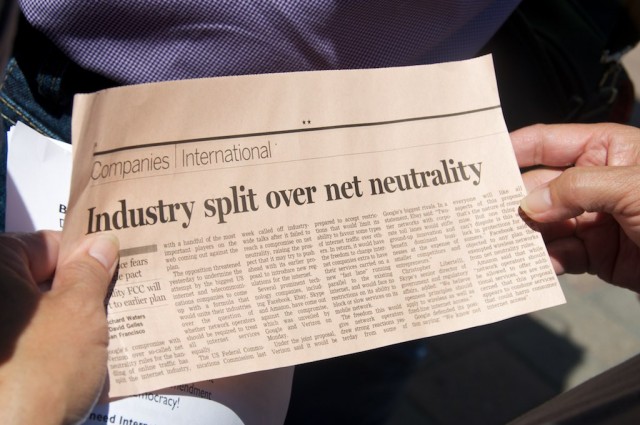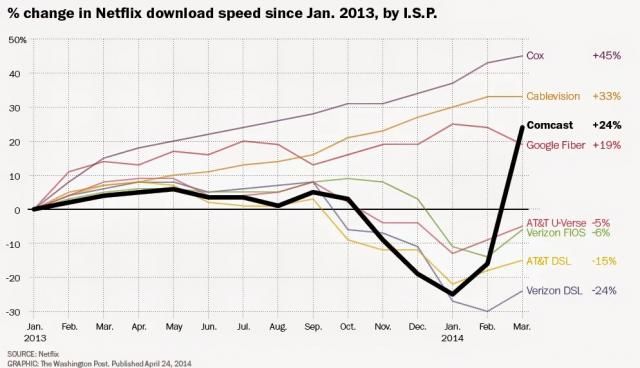
FCC Commissioner Michael O’Rielly today blasted the commission's net neutrality proposal, calling it too "onerous" for Internet service providers and saying there should be no net neutrality rules until "there’s evidence of an actual problem it would address."
O'Rielly, one of two Republicans on the five-member FCC, co-wrote an op-ed in National Review with US Rep. Marsha Blackburn (R-TN). In it, they discussed the rules the FCC voted in favor of in May. This proposal was also widely panned by net neutrality advocates because even though it would prevent ISPs from blocking content, it would also allow them to charge third-party Web services for a faster path to consumers, or a "fast lane." FCC Chairman Tom Wheeler said his rules would prevent ISPs from degrading the traffic of Web services that don't pay fast lane tolls, but opponents say that creating a faster path for those that do pay is essentially the same thing.
O'Rielly thinks the FCC erred by issuing rules at all. "In its most recent Notice of Proposed Rulemaking on net neutrality, the FCC shirked its responsibility again. The commission’s woefully inadequate 'analysis' started with an unfounded assumption that the rules would be beneficial, then proposed several pages of onerous requirements, and concluded with one meager paragraph seeking comment on how to minimize the unquantified burdens," Blackburn and O'Rielly wrote. "Seeking comment on burdens is no substitute for performing an actual cost-benefit analysis, and doing so as an afterthought shows a disregard for the president’s directives."
They noted that "[i]n Executive Order 13563, President Obama reaffirmed that executive agencies should 'propose or adopt a regulation only upon a reasoned determination that its benefits justify its cost' and must 'use the best available techniques to quantify anticipated present and future benefits and costs as accurately as possible.'"
If the FCC had followed this guideline, it wouldn't have issued any rules, they claim. "If the Commission fully adheres to this directive, it should refrain from imposing net-neutrality regulations unless there’s evidence of an actual problem it would address and unless the benefits of the regulations would clearly outweigh the costs," they wrote. "But on the issue of net neutrality, the agency has already conceded that there is no current harm to consumers. It has even bragged that the rules would be 'prophylactic.'"
Further, they argued that "the compliance costs for ISPs would certainly outweigh the hypothetical benefits for consumers, who are not experiencing any concrete harm today. Instead, the FCC made a groundless, impassioned decision to press forward without doing the necessary work."
O'Rielly got some pushback on Twitter, with Wi-Fi expert Andrew von Nagy saying, "But consumers HAVE seen harm! Comcast-BitTorrent for example. And high prices for low quality service."
The op-ed says that prioritizing some traffic over others is sensible policy. "Consumers can already access whatever Internet content, applications, and services they desire. When traffic is treated differently, such as prioritizing a voice call or video stream over an e-mail, it is part of sensible network management," Blackburn and O'Rielly wrote.
In fact, the FCC's proposal does allow prioritization if it is considered "reasonable network management," although this term is defined vaguely. There is also a carveout for "specialized services" offered by Internet providers, such as VoIP phone services.
Besides outlawing blocking or degrading of traffic, Wheeler's rules would require ISPs to make disclosures about network practices that might affect consumers. Blackburn and O'Rielly don't like that, either. "Broadband providers would be expected to report on every aspect of their practices and services, including metrics like jitter and packet corruption, which are unlikely to be meaningful to the average consumer. Expensive and burdensome reports that add no measurable consumer benefit are exactly the type of regulatory overreach that cost-benefit analysis is meant to prevent," they wrote.
The FCC's proposal wouldn't necessarily require disclosure about jitter and packet corruption, however. As a Notice of Proposed Rulemaking, it proposes a set of rules and then asks the public whether the proposal should be changed before being approved. In this case, the FCC is proposing to require disclosures on "the source, location, timing, speed, packet loss, and duration of network congestion." The FCC then asks if it should expand that rule to include jitter and packet corruption.
The FCC voted 3-2 in favor of the proposal, with O'Rielly and fellow Republican Ajit Pai dissenting. The commission is accepting initial comments from the public until July 15 and then reply comments until September 10. After that, the FCC will work on a final set of rules.

reader comments
340